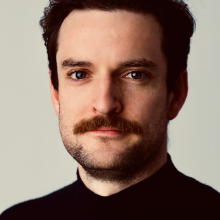General information
Popular music and media have had a significant impact on the cultural history of the 20th century. However, corresponding academic reflection has long been neglected in German-speaking countries. While internationally there have been interdisciplinary study programmes in the field of popular music and media for some time, in Germany the institutionalisation of popular music research has only just begun. In fact, there are still few study programmes in which a comprehensive and systematic examination of the phenomenon takes place. You either study music or media - and then you are far from studying pop. The Bachelor's and Master's degree programme "Popular Music and Media", which is unique in Germany to date, forms an interface between academic reflection and professional practice. By acquiring academic skills on the one hand and gaining practical experience in music and media on the other, students will have the opportunity to develop into reflective practitioners and experienced theorists.
In the 21st century, the vast majority of music listening is media-mediated. Even when using non-music-specific media offerings from film, television or the Internet, it is now rather unlikely that you will not hear music at the same time. However, the connection between popular music and media is not just an external one. In conjunction with fundamental social upheavals, processes of mechanisation and economisation of (music) culture began in the 19th century. As a result, a mass entertainment culture developed for the first time. In addition to social and political changes, technical developments played a prominent role in this, insofar as they made the emergence of mass media possible and thus also the mass distribution and commercial exploitation of music. Mass printing, sound storage and reproduction, but also radio technology, photography and film, as well as the entire field of computer technologies, are central to this.
The effects of the mass media on musical culture were varied and far-reaching. Firstly, many musical innovations of the 20th century were only made possible by the existence of new technologies - such as crooning, overdubbing, remixing and scratching. Secondly, music was and is often conceived with a view to the conditions of its medial mediation and its later utilisation. As early as the 19th century, for example, operettas were composed in such a way that individual pieces could be easily separated out so that they could also be utilised on the sheet music market, or when many years later the market launch of the long player and the associated longer playing time stimulated the development of concept albums. Thirdly, the entertainment on offer in film, radio and television was naturally enhanced by music from the very beginning, which led to the development of specific musical forms and design conventions.
However, the effects of the mechanisation and economisation of music culture were not only audibly reflected in the music itself. Musical practice as a whole was permeated by technology. Hardly any live concert today can do without technical support and every backyard band, no matter how unknown, is now able to produce its own recordings thanks to user-friendly and inexpensive technology. The mechanisation of music culture has an even broader impact in the field of music reception. Today, listening to recorded music accounts for the majority of music reception, whereas the first music reproduction devices at the end of the 19th century could only serve as fairground attractions or as prestige objects for well-heeled technology enthusiasts due to their bulky format, poor sound quality and horrendous prices. Contemporaries at the end of the 19th century observed with amazement how recording and playback technology detached music from the moment of its creation for the first time. In the years before and after the turn of the millennium, a further detachment could be observed in the course of digitalisation, namely that of mere sound information from the material sound carrier. Compression processes, increased storage capacities and computing power as well as the ever-improving infrastructure of the internet make it possible for people today to carry huge music libraries with them on the smallest of data carriers and to access the almost infinite music archives on the internet from almost anywhere.
As a result of this, but also due to the omnipresence of the musicalised media that surround us, music now permeates every niche of our everyday lives. The sound of a live rock concert on the car radio, a symphony in the living room, a disco remix at a private barbecue or a jazz piano in the bedroom: listening situations that were unthinkable a century ago are now commonplace and hardly cause any irritation. Of course, it makes a difference whether you listen to the organ from your sofa at home or from the church pew, or whether you listen to the latest dance track in the club, while jogging or even in the lecture theatre. The meaning of music can change depending on the media and spatial context in which it is listened to. Popular music and media were and are therefore interwoven in many different ways and in a profound way - so a real understanding of the cultural and social meanings of popular music can only succeed if these media contexts are always taken into account.
However, academic research into these and similar popular cultural contexts has long been neglected in German-speaking countries. Apart from a few academics who have been endeavouring for many years to conduct comprehensive research into the context described, German popular music research has long been neglected. While internationally there has been overarching research and even degree programmes in the field of popular music and media for some time now, the institutionalisation of popular music research in Germany has only just begun. In fact, study programmes in which popular music is an integral part of the curriculum and in which an overarching and systematic examination of the phenomenon takes place are still an exception in this country.
One exception to this rule is the "Popular Music and Media" degree programme at Paderborn University. In the spirit described above, both the Bachelor's and Master's degree programmes are designed in such a way that students are given the opportunity to take a comprehensive look at and understand the phenomena described, i.e. from various disciplinary perspectives - in short: to study them. On the one hand, the university aims to prepare and promote adequate research into the subject area. On the other hand, the programme aims to prepare students for a career in the music and media industry and at the same time familiarise them with the special social, media and cultural dimensions of popular music cultures. A combination of cultural studies, practical media studies and business studies should enable graduates of the degree programmes to act successfully and culturally responsibly in the professional fields of pop music and media culture.
The idea for the institution of such a degree programme was developed by members of the Music subject area at Paderborn University and the Detmold/Paderborn Musicology Seminar. The interdisciplinary degree programme was offered for the first time in the winter semester 2002/2003 and was designed from the outset as a cooperation project between different departments in order to be able to deal with the fields considered important for the subject context in an equally professional manner.
Both the Bachelor's and Master's programmes in "Popular Music and Media" are managed by the Music subject area at Paderborn University. The permanent cooperation partners of the Music subject area include
- the Musicology Department of the Detmold University of Music and the Paderborn University
and, belonging to the Paderborn University in each case
- the Institute for Media Studies,
- the Faculty of Business Administration and Economics,
- the Centre for Information and Media Technologies (IMT) and
- the Centre for Language Teaching.
In addition to these institutional cooperation partners, the Department of Music constantly engages renowned experts for teaching assignments and guest lectures in fields such as music management, music journalism, music law and artistic practice.
This enables students to benefit from the experience of these experts. In addition, there are many opportunities to actively test themselves in various fields of music and media practice. An internship or optional semester abroad has been installed in the Bachelor's programme for this purpose. In addition, projects and excursions are regularly carried out under the guidance of lecturers, in which students can get involved according to their interests, be it in the field of press relations, acquisition, organisation/management or artistic practice. Successful examples of this include seminars on artist coaching, the AStA summer festival and the Zwischenmiete series.
In addition, various institutions offer opportunities to acquire practical music and media knowledge and skills. These include the university's own Information and Media Centre (IMT) with an extensive range of practical media courses, the campus radio station L'Unico, an in-house recording studio, various ensembles and bands, the studio stage and the Centre for Language Teaching with regular courses. The Open Stages organised by the Popular Music and Media and Music Teaching Departments also offer space for musical practice.
Students on the Master's programme also have regular opportunities to test themselves in the various pop music cultural application areas. In addition to the above-mentioned fields of music and media practice, special attention is paid to academic practice. Master's students are involved in the organisation and implementation of guest lectures, symposia, research projects and excursions in Germany and abroad.
Within the four successful (re-)accreditation procedures of the Bachelor's and Master's programmes to date, the experts emphasised the successful integration into the university concept ("University of the Information Society") with an outstanding profile, the strong professional orientation and the high appreciation of the degree programmes by the students. Since 2008, students on both the Bachelor's and Master's programmes have been offered the opportunity to sharpen their profile in a targeted manner, either with a focus on economics or cultural studies.
Further information on the programme content and admission requirements can be found on the subpages of this section.
Student counselling

Vertrauensdozent
Office: H7.301
Phone: +49 5251 60-4559
E-mail: joshua.wick@uni-paderborn.de
Office hours:
In der Vorlesungszeit: Donnerstag 10-11 Uhr (mit Anmeldung per Mail).
Sonst nach Absprache per Mail.

Office: H7.201
Phone: +49 5251 60-3142
E-mail: noesner@mail.uni-paderborn.de
Office hours:
Mittwochs 11:00 - 12:00 Uhr



